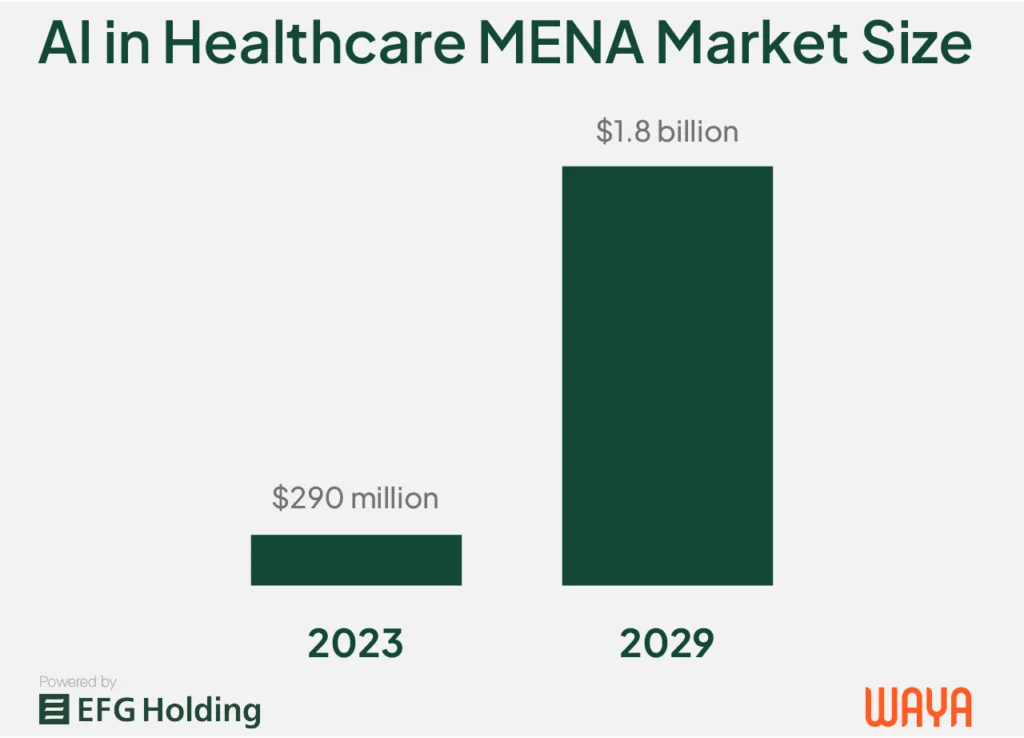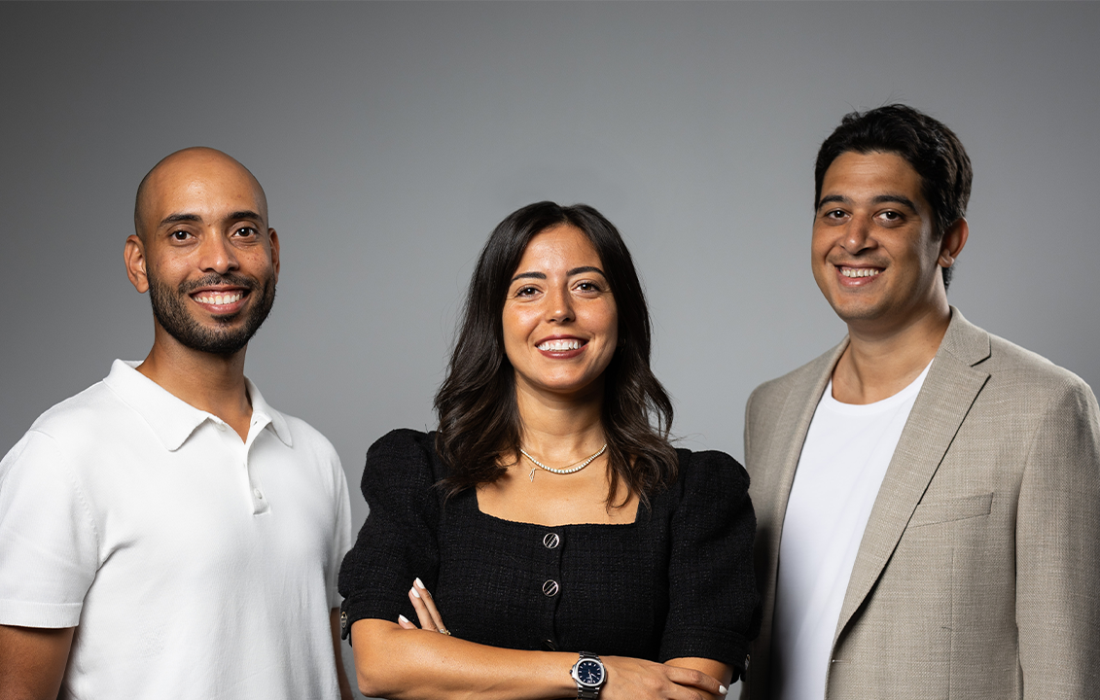By the Numbers is a biweekly data-driven series in partnership with EFG Holding that unpacks business news and economic trends across the MENA region. Through visuals and statistics, each edition brings clarity to the numbers shaping the future of our region.
Artificial intelligence is no longer a futuristic concept in Middle Eastern and North African healthcare; it’s the engine of a huge shift. Fueled by exploding data, strategic investments, and a growing demand for personalized care, the region is poised to transform how diseases are diagnosed, treatments are tailored, and lives are saved.
What Is AI in Healthcare?
AI in healthcare refers to technologies that mimic human intelligence to support or automate medical tasks. This includes:
- Machine learning: analyzing medical images, predicting diagnoses.
- Natural language processing: reading and summarizing patient records.
- Predictive analytics: forecasting disease risks or treatment outcomes.
- Generative AI: powering patient-facing chatbots, decision tools, and virtual assistants.
Its global size was estimated at USD 26.69 billion in 2024, dominated by the U.S. and China. But in MENA, a new story is unfolding, one tied to national health transformations, regulatory modernization, and cross-sector investment.
By the Numbers: Big Boom with 35.8% CAGR

Source: BCC Research.
Beyond the numbers, the data tells an interesting story:
- 35.8% CAGR makes MENA the world’s fastest-growing AI healthcare market.
- The data excludes Turkey, as its more advanced market would skew the analysis of emerging opportunities.
- Still, MENA only represents 2% of the global AI in healthcare market, meaning massive room to scale.
What’s Driving the Growth?
Unlike global markets driven by chronic disease burdens or rapidly growing geriatric population, MENA’s boom stems from:
1. Expanding Medical Databases
The digitization of health systems has led to a surge in medical data, ranging from electronic health records to imaging and genetic profiles. This explosion of data is fueling demand for AI solutions capable of processing large datasets rapidly and accurately.
These databases are becoming more integrated and comprehensive, enabling AI to support earlier diagnoses, identify treatment patterns, and generate personalized insights. With chronic disease on the rise and prevention becoming more central, AI’s predictive power is emerging as a game-changer.
The more data these systems ingest, the more effective and intelligent they become, positioning AI as a cornerstone of MENA’s data-driven healthcare transformation.
2. Rising Investment in AI Infrastructure
Governments and private players across the region are significantly ramping up investments in AI infrastructure—think data centers, hospital digitalization, and national AI strategies.
Countries like Saudi Arabia and the UAE are leading the way, combining financial muscle with policy support to build high-capacity data environments for AI in healthcare.
But increasingly, private capital is stepping in to scale the transformation.
In Saudi Arabia, EFG Hermes advised on the $500M IPO of Specialized Medical Company (SMC), which is aligned with NPHIES, the Kingdom’s AI-enabled health and insurance integration platform.
In Egypt, EFG Hermes also led a $190M DPI investment into Alameda Healthcare, which is deploying AI-based oncology diagnostics.
Together, these moves signal that AI in MENA healthcare is becoming investable, not just aspirational.
3. The Push Toward Personalized Medicine
AI is powering a shift from reactive to proactive healthcare. By analyzing individual patient data—such as genetics, lifestyle, and health history—AI systems can help design more precise and effective treatment plans.
This emphasis on personalized care is especially relevant in MENA, where healthcare delivery systems vary in maturity and access. AI-driven personalization offers a pathway to improve outcomes while optimizing resources.
From predictive modeling to treatment customization, the advancements in AI capabilities have made it crucial to respond to modern medical needs.
4. A More Supportive Regulatory Landscape
Unlike a few years ago, several MENA countries are now actively developing AI governance frameworks that account for data privacy, ethics, and cybersecurity.
Saudi Arabia and the UAE, in particular, have taken early steps to build policy environments that enable AI adoption while safeguarding patients’ rights. This balance is essential for scaling AI across clinical settings and for building public trust in new technologies.
Challenges: What Could Slow the Momentum?
The growth outlook is promising, but not without friction. Three structural challenges still threaten to hold the region back:
1. Regulatory Gaps and Uncertainty
While progress has been made, many MENA countries still lack comprehensive, sector-specific AI regulations. This creates uncertainty for investors and healthcare providers navigating implementation.
Without regionally aligned standards, scaling AI solutions across borders remains difficult. Tailoring guidelines to local contexts—while aligning with international frameworks—will be key.
2. Talent Shortages
AI’s potential hinges on people as much as platforms. The region faces a shortage of healthcare professionals trained in AI applications, from data interpretation to system integration.
To address this, countries must invest in interdisciplinary education, bringing together healthcare, data science, and engineering through tailored programs and industry-academic partnerships.
3. Data Security and Privacy Risks
As medical data becomes the fuel for AI, the stakes of protecting it grow. Cybersecurity vulnerabilities and unclear data handling rules can stall adoption and erode trust.
A proactive approach to data governance—rooted in secure infrastructure, transparent consent protocols, and regional best practices—is essential.
What to Watch
1. Expanded Use Cases and Applications
Beyond diagnostics, expect to see AI expand into clinical decision support, workflow automation, real-time patient monitoring, and mental health tools. These use cases promise efficiency gains and improved outcomes.
2. Strategic Partnerships
Collaboration will define the next chapter. Governments, hospitals, tech firms, and research institutions are increasingly joining forces to drive innovation. These alliances will be crucial for overcoming fragmentation and resource constraints.
3. Regulatory Alignment and Innovation Hubs
We anticipate more countries in the region to introduce clear AI health policies, paving the way for cross-border data exchange and investment. Innovation hubs, particularly in the Gulf, will likely serve as testbeds for regional rollouts.
If you see something out of place or would like to contribute to this story, check out our Ethics and Policy section.













